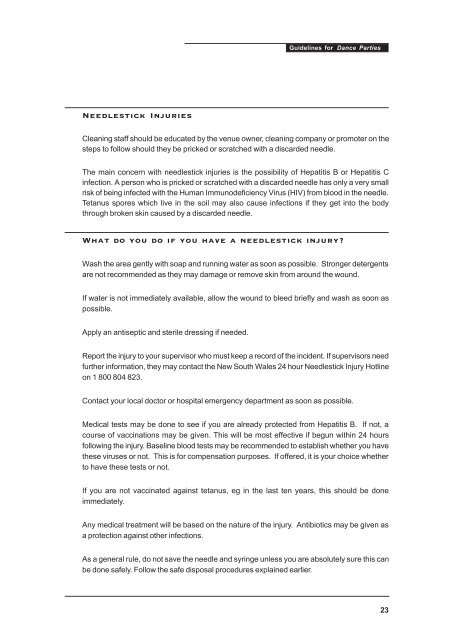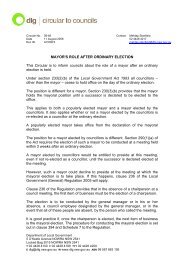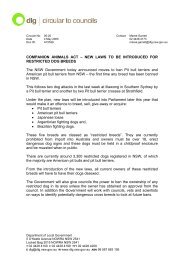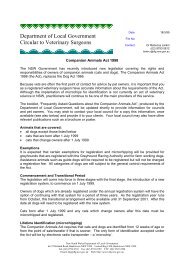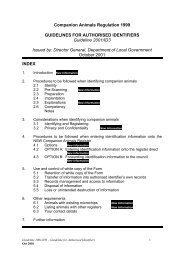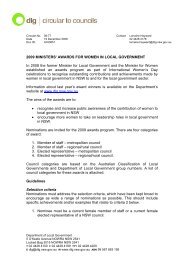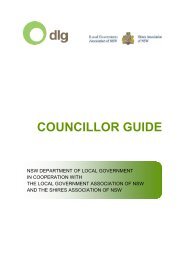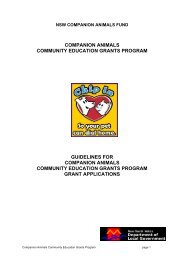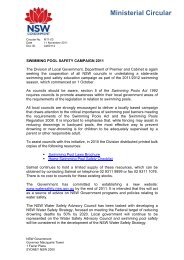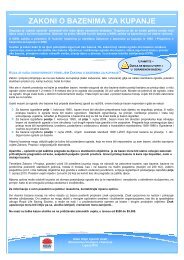<strong>Guidelines</strong> <strong>for</strong> <strong>Dance</strong> <strong>Parties</strong>Needlestick InjuriesCleaning staff should be educated by the venue owner, cleaning company or promoter on thesteps to follow should they be pricked or scratched with a discarded needle.The main concern with needlestick injuries is the possibility <strong>of</strong> Hepatitis B or Hepatitis Cinfection. A person who is pricked or scratched with a discarded needle has only a very smallrisk <strong>of</strong> being infected with the Human Immunodeficiency Virus (HIV) from blood in the needle.Tetanus spores which live in the soil may also cause infections if they get into the bodythrough broken skin caused by a discarded needle.What do you do if you have a needlestick injury?Wash the area gently with soap and running water as soon as possible. Stronger detergentsare not recommended as they may damage or remove skin from around the wound.If water is not immediately available, allow the wound to bleed briefly and wash as soon aspossible.Apply an antiseptic and sterile dressing if needed.Report the injury to your supervisor who must keep a record <strong>of</strong> the incident. If supervisors needfurther in<strong>for</strong>mation, they may contact the New South Wales 24 hour Needlestick Injury Hotlineon 1 800 804 823.Contact your local doctor or hospital emergency department as soon as possible.Medical tests may be done to see if you are already protected from Hepatitis B. If not, acourse <strong>of</strong> vaccinations may be given. This will be most effective if begun within 24 hoursfollowing the injury. Baseline blood tests may be recommended to establish whether you havethese viruses or not. This is <strong>for</strong> compensation purposes. If <strong>of</strong>fered, it is your choice whetherto have these tests or not.If you are not vaccinated against tetanus, eg in the last ten years, this should be doneimmediately.Any medical treatment will be based on the nature <strong>of</strong> the injury. Antibiotics may be given asa protection against other infections.As a general rule, do not save the needle and syringe unless you are absolutely sure this canbe done safely. Follow the safe disposal procedures explained earlier.23
<strong>Guidelines</strong> <strong>for</strong> <strong>Dance</strong> <strong>Parties</strong>7. UNDER 18 (ALCOHOL FREE) DANCE PARTIESIf promoters intend to hold under 18s (alcohol free) dance parties, there are some extrarequirements that need to be considered.Under 18s dance parties should be organised in a similar way to any other dance party, exceptthat promoters must make sure that alcohol is not brought into the venue, and that gaming(e.g., gambling) does not take place. Also, when hiring security staff, it is recommended thatpromoters check whether the security staff being hired have experience in supervising a youngercrowd. As an option, you might want to set up a cloak room to ensure that bags, packs andother materials are kept out <strong>of</strong> the general dance floor area.Make sure you pay particular attention to the availability <strong>of</strong> public transport <strong>for</strong> patrons to getto and from the dance party. You could also consider providing patrons with access to a publictelephone at the venue. Passouts are not recommended <strong>for</strong> under 18s dance parties.Since October 1996, licensed premises are allowed to stage alcohol free entertainment inauthorised sections <strong>of</strong> the premises. While the requirements set out below are mandatory <strong>for</strong>under 18s dance parties in licensed premises, many <strong>of</strong> them can be considered as options <strong>for</strong>promoters to consider when holding under 18s dance parties in other venues.Requirements <strong>for</strong> Under 18s <strong>Dance</strong> <strong>Parties</strong> on Licensed PremisesTo hold an under 18s dance party in an hotel or registered club, the licensee or club managermust apply <strong>for</strong> a “minors function authority” (<strong>for</strong> hotels) or a “functions authority” (<strong>for</strong> clubs,which includes functions <strong>for</strong> non-members). The application should be made to the <strong>NSW</strong>Licensing Court at least 21 days be<strong>for</strong>e the event. The Police Service’s <strong>Local</strong> Area Commandermust be notified in writing, via the local Police Station, 7 days be<strong>for</strong>e the event.An authority to hold an under 18s dance party may be subject to certain conditions, includingthose listed below.Supervision/security - under 18s dance parties must be supervised by adults over 21 years <strong>of</strong>age, with one supervisor/security staff <strong>for</strong> every 100 patrons. Supervision/security must includechecking tickets and bags on entry, patrolling toilets, supervising the function and access areasand patrolling the area around the licensed premises, checking that other patrons <strong>of</strong> the licensedpremises do not enter the party and that under 18s do not move to other areas <strong>of</strong> the premises.Advertising - advertising <strong>for</strong> the dance party must state that the party is alcohol free, hasadult supervision, that entry is by pre-sold tickets only, and that any minor suspected <strong>of</strong> havingconsumed alcohol will be refused entry. If the dance party is to be held in an hotel, advertisingmust also specify that any person suspected <strong>of</strong> being under 15 years will not be admitted.Function area - under 18 patrons must not move into other areas <strong>of</strong> the licensed premises, andother hotel/club patrons must not bring liquor into, or enter, the function area where the dance partyis being held. Signs denying access into, or out <strong>of</strong>, the function area must be displayed.Passouts - passouts reduce the ability to control the event and increase security problems and arenot recommended <strong>for</strong> under 18s dance parties. Where passouts are not available, patrons shouldbe warned be<strong>for</strong>e they enter the venue that if they leave the party they may not be re-admitted.24


